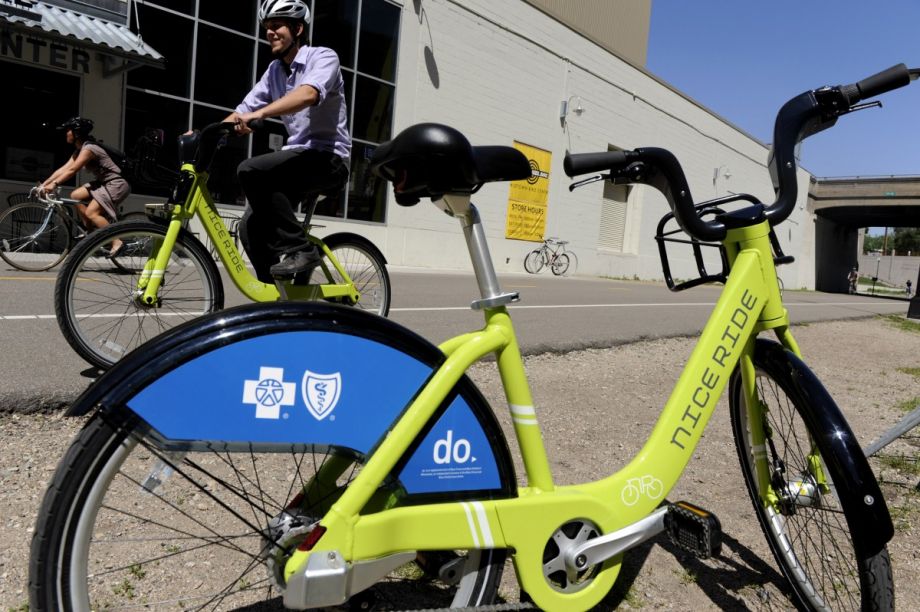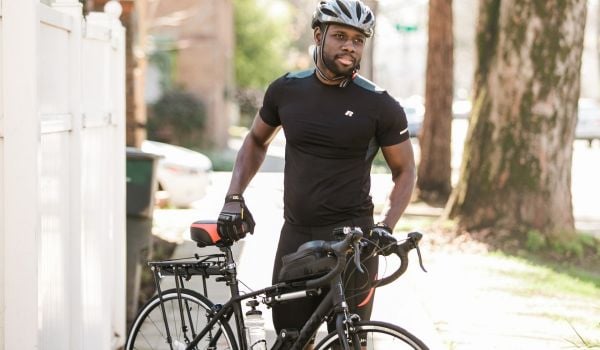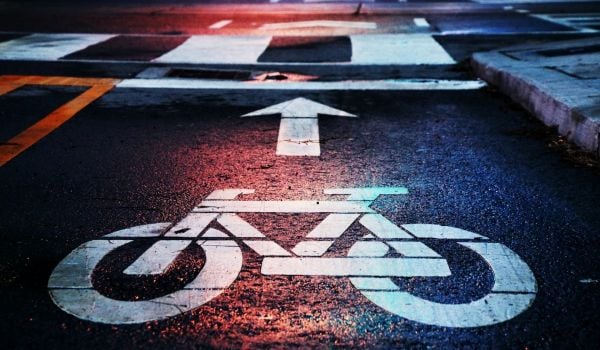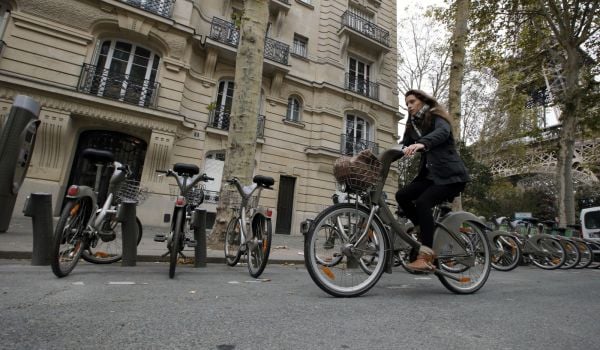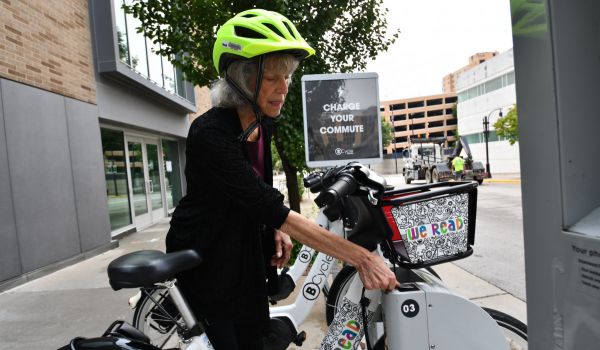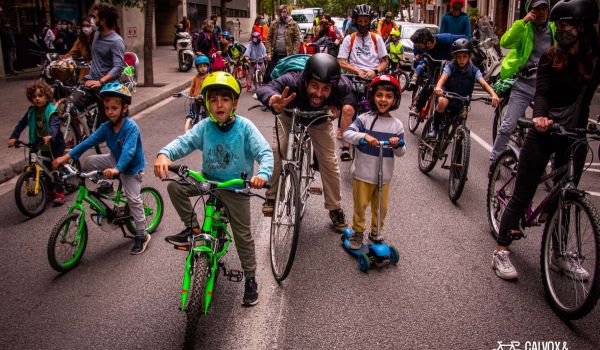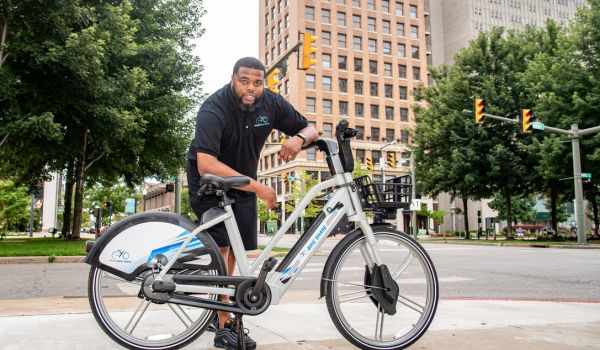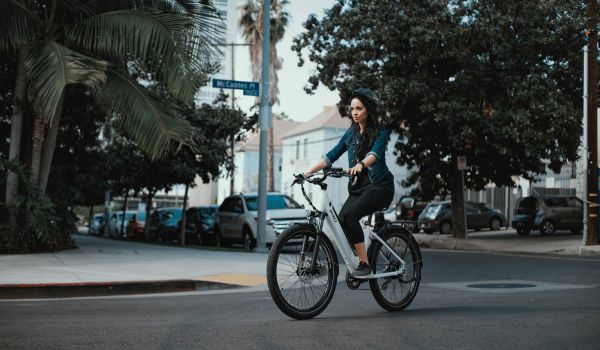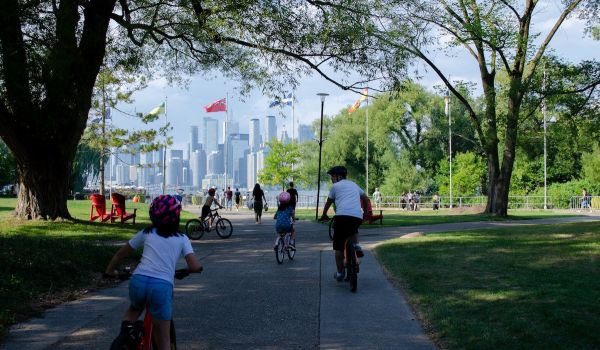Since modern bike-share’s introduction to the United States in 2008, the nonprofits, the departments of transportation, advocacy organizations and businesses behind the systems have been asking two key questions: How do you make bike-share financially sustainable and how do you make it equitable?
Neither question has really been answered yet, but the Better Bike Share Partnership (BBSP) just awarded seven grants totaling nearly $375,000 to help remedy the latter. Funded by the JPB Foundation, BBSP is a collaboration between PeopleForBikes, the City of Philadelphia, Bicycle Coalition of Greater Philadelphia and the National Association of City Transportation Officials (NACTO).
Zoe Kircos, PeopleForBikes grant manager, explains that BBSP is trying to establish best practices for equitable bike-share systems that can be replicated everywhere.
“At it’s most basic, we’re striving for bike-share systems that have annual and daily users that reflect the population of the city as a whole,” Kircos says. “The way you set up the system provides equal access. Not just in the location of the system, but in the pricing and payment system, the bike infrastructure around stations.”
BBSP has $900,000 in grant funding to award over the next three years. In the first round they awarded:
- $50,000 to Austin B-Cycle to expand Spanish-language outreach and education and implement subsidized memberships and cash payment options.
- $51,760 to Boston Hubway to expand their subsidized membership program and their Prescribe a Bike program that allows doctors to prescribe bike-share to patients.
- $75,000 to nonprofit Bedford Stuyvesant Restoration Corporation. They are doing outreach and education campaigns tied to other community services to promote the 26 new Citi Bike stations in their neighborhood.
- $25,000 to Capital Bikeshare to fund an ambassador outreach program and the creation of a multilingual how-to video and other materials about using bike-share.
- $20,000 to Charlotte B-Cycle to do outreach in neighborhoods across the city to encourage people to use bike-share for their Friday commutes with the hope that it leads to higher ridership long term.
- $75,000 to Divvy in Chicago to implement a subsidized membership program and do outreach and engagement in the Bronzeville neighborhood.
- $74,986 to Portland State University in Portland, Oregon, to collect and study data about “perceptions of bike-share, barriers to use, success of specific interventions to increase use, and the impact of station siting decisions” with Philadelphia’s Indego bike-share. The researchers are seeking additional funding to research another two or three bike-share systems for their study. (Portland State was recently behind a huge study of protected bike lanes.)
Kircos says the grantees will report back on their experiences and provide metrics such as ridership and demographics data. NACTO will use the information to help inform a bike-share equity best practices guide they are authoring.
BBPS is operating on the assumption that bike-share can be equitable. But some bike advocates question the feasibility of an equitable bike-share system at all — especially one that was not designed to be equitable from the start. Melody Hoffmann is a bicycle equity researcher and member of the Minneapolis Bicycle Coalition’s diversity task force. She thinks part of the problem is that financial sustainability is often in conflict with equity.
“Bike-share systems are not designed for a diversity of users. They’re designed make money in certain areas of the city,” she says. Hoffmann says Minneapolis’s system, like many around the U.S., was set up to make money in its first year.
“Nice Ride from the beginning was designed for tourists and business people and people that were already invested in biking,” she says. “If you have a system that’s set up that way to ensure it makes money that first year, you’re going to put the stations where they’re going to make money. If that’s the model it’s just not going to be equitable.”
Nice Ride Executive Director Bill Dossett says it’s true that the station locations were initially chosen to make money and prove the bike-share concept, but says they quickly expanded into the lower-income North Minneapolis neighborhood.
“Our funders wanted us to demonstrate that bike-share can cause mode shift from single passenger automobiles into bikes and other way to get around … . When we launched [in 2010], we started downtown, near University of Minnesota and the high-density, multi-family neighborhood immediately south of downtown,” Dossett says. Shortly after launching, Nice Ride received complaints that they had overlooked North Minneapolis. Ten months later, they installed 11 stations in the neighborhood.
“We heard from people that because of historic disinvestment it’s important we get stations in North Minneapolis early on. We responded and did that,” says Dossett. “The land use characteristics [there] are single-family homes and not a lot of high-density retail activity. Some people try to say those stations are a failure because usage isn’t high. Nobody ever expected usage to be high there.”
To his mind, ridership is less about demographics than land use. Dossett says they have stations in other high-density, low-income neighborhoods where they, “do expect over time to see high utilization.”
Hoffmann says demographics and geographic limitations often go hand in hand, however.
“A lot of times working-class neighborhoods and neighborhoods that are predominantly people of color are isolated and not very dense,” Hoffmann says. “Bike-share doesn’t meet their transportation needs. In Minneapolis there was a study that showed people of color spend way more time commuting to their job so they just can’t get to work in 30 minutes on bike-share.”
Tufts University urban planning professor Julian Agyeman refers to what’s now happening with many existing bike-share systems as “retrofitting equity.” He writes on his blog that most systems were, “designed around environmental and economic goals intended to stimulate urban renewal. Social justice, to many is simply an afterthought; it is seen as a ‘retrofit’ once the scheme is up and running successfully for the targeted demographic: the ‘usual suspect.‘”
Agyeman says the question advocates must answer is, “How do we move equity and justice to the center in designing just, equitable and sustainable cities, rather than retrofitting them after our ‘real’ goals have been met?”
Arguably BBPS’s attempt to create replicable equity best practices for bike-share systems is an effort to answer that question.
But, Hoffmann says, if the studies ultimately find that bike-share and equity are incongruous, “that’s OK. … If [bike-share] doesn’t work, do equitable bike programming in a different way.”
Bike-share is ultimately still in its infancy in the U.S. and if and how it can be equitable is just one of several key questions its boosters need to answer. As Kircos says, “Bike-share doesn’t really know yet what it’s supposed to be.”
BBPS’ grant-funded studies are one of the largest concerted efforts to answer some of those questions thus far. Hopefully they can help shape American bike-share systems moving forward.
Editor’s Note: This article was updated after an interview with Nice Ride Executive Director Bill Dossett.
The Works is made possible with the support of the Surdna Foundation.

Josh Cohen is Crosscut’s city reporter covering Seattle government, politics and the issues that shape life in the city.
Follow Josh .(JavaScript must be enabled to view this email address)


